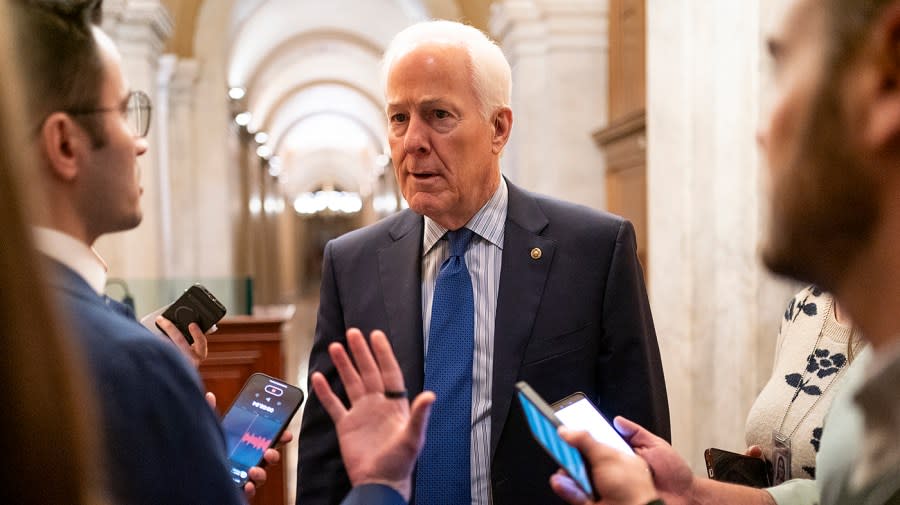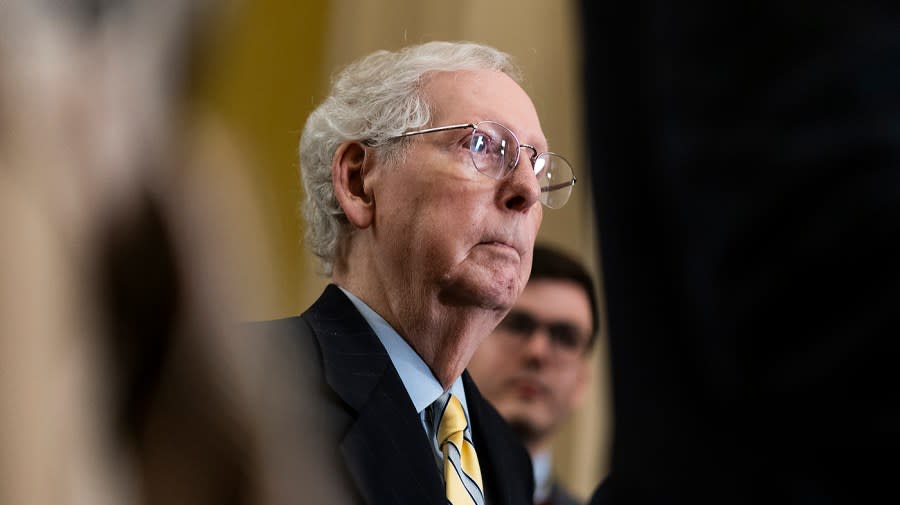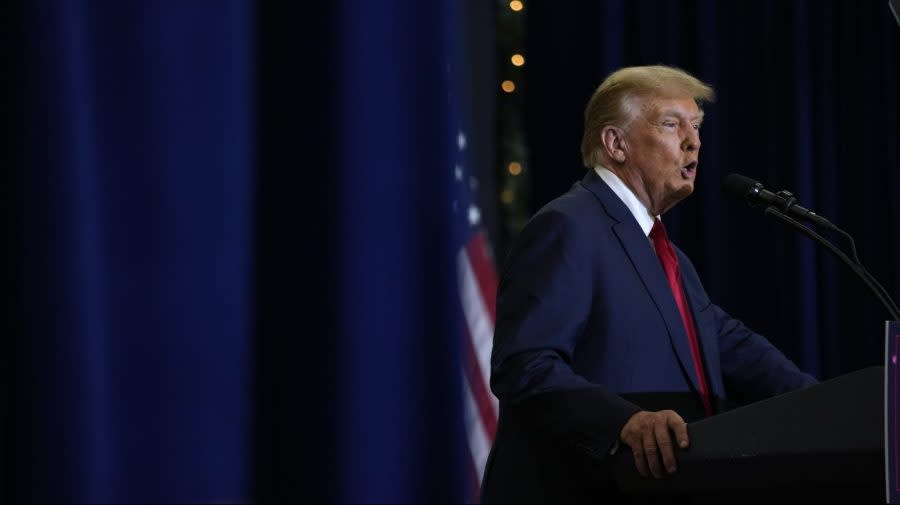GOP senators slap down Trump on Jan. 6 ‘hostages’

- Oops!Something went wrong.Please try again later.
- Oops!Something went wrong.Please try again later.
Republican senators are slapping down President Trump’s claim that people convicted of Jan. 6-related crimes are “hostages” who should be pardoned or set free by President Biden or a future president.
Three years after a mob of pro-Trump protestors invaded the Capitol to stop the certification of the 2020 presidential election, GOP senators who witnessed the violence of that day bristle at the characterization of individuals who were convicted of crimes as “hostages” or political prisoners.
“I don’t condone that characterization at all, no,” said Senate Republican Whip John Thune (S.D.) when asked about Trump calling Jan. 6-related convicts “hostages.”
“We got a justice system and they’re working through it,” Thune said of the nearly 900 people convicted of Jan. 6-related crimes, including more than 200 people who have pleaded guilty to felonies.
Sen. John Cornyn (Texas), a member of the Senate Republican leadership team, dismissed Trump’s claim — echoed by some other Republicans — that individuals who were convicted of destroying property or assaulting police officers in the Capitol are “hostages.”
“Somebody who’s been duly convicted of a federal crime is not a hostage,” he said.

Sen. John Cornyn (R-Texas) speaks to reporters as he leave the Capitol following a procedural vote regarding a nomination on Monday, January 8, 2024. (Greg Nash)
He expressed confidence that people who were tried and convicted, such as the former leader of the Proud Boys, received due process.
“I’m a big believer in our criminal justice system and believe that people are presumed to be innocent until proven guilty in a court of law. But once they are, I accept that verdict and that judgment,” said Cornyn, a former Texas state Supreme Court justice.
More top stories from The Hill:
Trump team argues assassination of rivals is covered by presidential immunity
Judge rejects Trump 14th Amendment claim in Nevada by GOP political competitor
Trump: Georgia case ‘totally compromised’ after allegations against Fani Willis
Asked about the third anniversary of Jan. 6 and the characterization of people convicted of storming and damaging the Capitol as “hostages,” Senate Republican Leader Mitch McConnell (R-Ky.) told reporters that he stands by the remarks he made at the end of Trump’s second impeachment trial when he denounced the former president and the “criminals” who “were carrying his banners, hanging his flags and screaming their loyalty to him.”
“Let me say this about Jan. 6: I’ve had remarks that I made on Feb. 13 of ’21 about how I felt about Jan. 6. I recently reread it, I stand by what I said,” McConnell said.
McConnell voted to acquit Trump of the impeachment charge of inciting an insurrection but did so on the technical grounds that he was no longer in office by the time the Senate held its trial.

Minority Leader Mitch McConnell (R-Ky.) addresses reporters after the weekly policy luncheon on Tuesday, December 12, 2023.
But he left no doubt that he viewed the actions of the people who overran Capitol police in a failed effort to stop the certification of President Biden’s victory as “criminals” who were spurred on by Trump’s “wild falsehoods” about a stolen election.
McConnell at the time accused the “mob” of attacking their own government and using “terrorism to try to stop a specific piece of democratic business they did not like.”
He said they “beat and bloodied our own police,” “stormed the Senate floor,” “tried to hunt down the Speaker of the House” and “built a gallows and chanted about murdering the vice president.”
McConnell and other Republican senators who fled the Senate chamber three years ago to protect themselves were personally shaken and disturbed by what they saw that day.
Sen. Thom Tillis (R-N.C.) balked at the notion that people convicted of Jan. 6 crimes are somehow hostages or political prisoners.
“That’s like calling drug traffickers unlicensed pharmacists. At the end of the day, they’re J6 convicts to me,” he said.
“If they were proven guilty in a court of law of a crime, it is what it is,” he said. “Are there some people that were swept up in it? Yeah, but use better judgment. If you were only accidently in the Capitol, you probably didn’t get convicted. If you hurt a police officer, you should have been convicted. If you broke anything on the Capitol, you should have been convicted. You should serve your time. Period, end of story.
“That’s not a hostage,” he added. “We have hostages held by Hamas right now. I have a different standard for what I consider hostages.”
Even with Trump heavily favored to win the nomination to serve as the Republican Party’s standard-bearer in 2024, the GOP senators who spoke with The Hill were not willing to swallow his campaign trail argument from Iowa that what happened on Jan. 6 was “patriotic and peaceful.”
Trump got cheers at a middle school in Clinton, Iowa, by calling for Biden to “release the J6 hostages.”
“They ought to release the J6 hostages,” he said. “I call them hostages. Some people call them prisoners. I call them hostages. Release the J6 hostages, Joe. Release them, Joe. You could do it real easy, Joe.”

Former President Trump speaks during a commit to caucus rally, Tuesday, Dec. 19, 2023, in Waterloo, Iowa. (AP Photo/Charlie Neibergall)
At least one high-ranking House Republican has embraced Trump’s characterization of people who have pleaded guilty or been found guilty of Jan. 6 crimes as hostages.
House Republican Chair Elise Stefanik (N.Y.) told NBC’s “Meet the Press” on Sunday that she has “concerns about the treatment of Jan. 6 hostages.”
“I believe we’re seeing the weaponization of the federal government against not just President Trump, but we’re seeing it against conservatives,” she claimed.
Those comments stirred speculation that Stefanik is angling to be Trump’s vice presidential pick.
“Does her change of heart have anything to do with wanting to be Trump’s running mate?” Rep. Jamie Raskin (D-Md.) asked in a post on X, the social media platform formerly known as Twitter.
About 170 people have received convictions after standing trial for Jan. 6 crimes, while more than 710 people have pleaded guilty.
More than 450 of those individuals have received prison sentences.
On Tuesday, Ray Epps, 62, who had been at the center of some of the most persistent conspiracy theories connected to the Jan. 6, 2021, attack on the Capitol, was sentenced to a year of probation for his role in the riot.
Epps had pleaded guilty in September to one count as part of a deal with Justice Department prosecutors. He admitted to engaging in disorderly or disruptive conduct in a restricted building or grounds after storming the Capitol.
Epps was sentenced the same day Trump was in Washington to attend a hearing in one of his own legal cases connected to the election. Trump is arguing he is immune from prosecution for actions connected to the election and Jan. 6 because he was president at the time. A three-judge panel on Tuesday seemed skeptical of his legal team’s arguments.
Sen. Jerry Moran (R-Kan.) told The Hill that “if you’re convicted of a crime, you are deserving of the punishment.”
“I think if you’re convicted of a crime, you’re a criminal,” he added.
Sen. Mike Rounds (R-S.D.) also slammed the door on attempts to portray people who broke the law by invading the Capitol as being unfairly persecuted for their political beliefs.
“I view them the same as the individual juries that convicted them. There was violence on that day. There were people that violated the law. There were people that tried to stop the peaceful transfer of power after an election,” he said.
“I do not agree with anybody that says they are political prisoners. That’s simply the way I see it,” he added.
Trump has said he would pardon many of the people convicted of Jan. 6 offenses if he’s reelected.
Republican senators say that’s a bad idea.
“I have nothing to do with whether a president grants a pardon, but I would think in most instances any blanket pardon is a mistake. Every pardon case ought to rest upon the specific facts of that individual,” Moran said.
Rounds, a former governor, said he had granted pardons in the past but only when individuals admitted they broke the law, expressed remorse, and indicated they would return to becoming a productive citizen.
“I did not issue blanket pardons,” he said.
For the latest news, weather, sports, and streaming video, head to The Hill.

